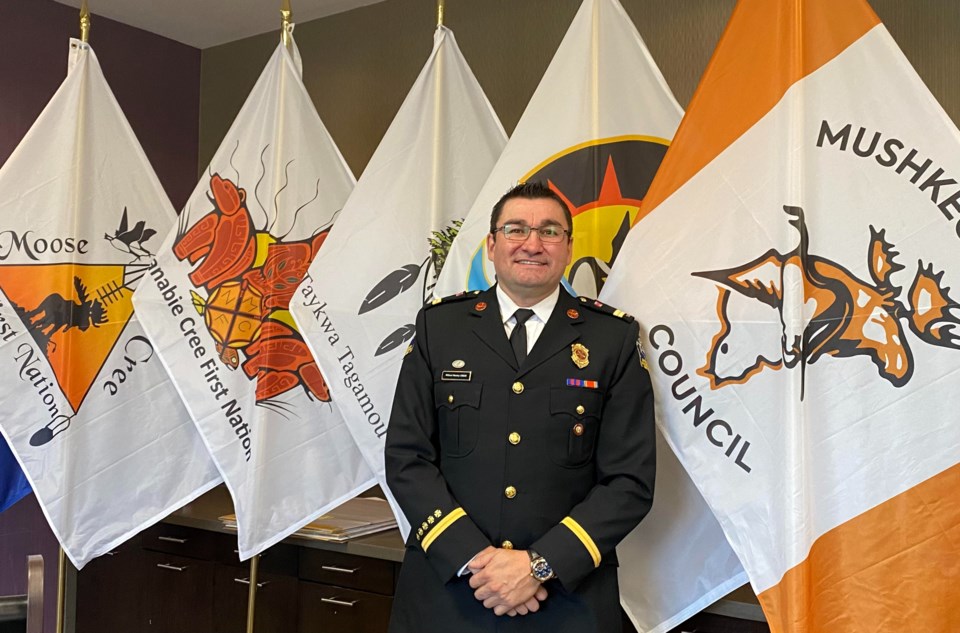As area leaders gather in Timmins, First Nations' capacity for their own emergency situations is front and centre on the agenda.
The first Mushkegowuk Emergency Response Summit is bringing together emergency services workers and community leaders to brainstorm ways to grow capacity and take control of emergency situations on their lands, with Indigenous leadership setting the plans in motion.
When it comes to evacuations, Mushkegowuk Council EMS manager Wilbert Wesley said a lot has transformed.
“We see new advancements coming out, the federal government has come out with plans in regards to the First Nations and what options First Nations have to bring us to the table and make decisions for ourselves," he told TimminsToday.
When remote communities on the James Bay coast are forced to evacuate due to forest fires or flooding, Timmins is one of the host communities. This year alone, hundreds of people were temporarily housed in the city.
RELATED: Hundreds being evacuated from remote Northern communities
How to address issues within evacuation plans is a high priority for Mushkegowuk's newly formed emergency response department, which was made official during its annual general meeting.
“We have a few First Nations in Ontario that have capabilities to host, however, it’s having to change the mindset of those who are affected on the options they have other than municipalities,” said Wesley. “We’ve been hosted by municipalities for the last 20 years, now within the last three to five years we have a few First Nations that have the capacity to host, and it’s just getting the buy-in from our other First Nations to try it out.”
Steps toward self-reliance in emergency situations are needed, Deputy Grand Chief South Natasha Martin said during a session Tuesday (Sept. 26) morning.
“What I hope people takeaway is that we can do this ourselves in terms of being Indigenous-led,” she said. “I think it’s really important that we focus on that because we know how to take care of our own people.”
She spoke to the gathering about issues she saw in evacuations while she was working in the nation rebuilding and governance office for Mushkegowuk.
“People wanted to come to Timmins, their elders were in Timmins, and they wanted to see their elders because in times of crisis, we want to see our family,” she said. “The host community told them no, I was just flabbergasted, I was in such shock that our people were being treated this way.”
Family reunification during evacuations should be a priority, said Wesley. That’s why he believes First Nations should be managing their own emergencies.
“We need to get to that place if we’re going to move forward,” he said.
Since the City of Timmins started hosting evacuations again in 2018, it's been working with Gervais Emergency Consulting, which has developed the Stronger Together Framework that goes beyond simply lodging to consider health, social and recreation components as well. It builds on the provincial and federal emergency response documents.
SEE: Evacuation plan gives everyone a voice
Partnerships with municipalities and contractors should be led by leadership from the First Nation, said Wesley. Things like prioritizing Indigenous service providers and transparent reporting of how the evacuation is handled are vital to building trust in those relationships.
"This is why I'm a firm believer in the Indigenous-led approach because I get the information without having to fight for it," he said. "We're willing to work with non-Indigenous NGOs (non-governmental organizations), non-Indigenous businesses, provided that they accept the joint command, Indigenous-led approach."
For the hosts that are interested in learning more about how the Indigenous-led model works, and how to work with the communities, Wesley said Mushkegowuk's emergency response department can offer education. The advantage of having Indigenous communities host evacuees is that there is a cultural shorthand
"It's time to change it up now, it's the 21st century now," he said.
Wesley wants to make sure leadership in all the communities knows their options.
“We made sure a lot of leadership and councils and those with decision-making powers are here today because they need to start looking at some mitigation and solutions to some of the very serious problems that we need to tackle as First Nations moving forward,” he said. “I’m hoping that this conference will bring a lot of disclosure, a lot of these questions that have been asked into the light with direct answers based on facts.”
Missinabie Cree First Nation’s, through its company ISN Maskwa, has been teaching Indigenous people how to respond to disasters and emergencies in First Nations through its incident management training course.
The community is also building its own evacuation centre with the goal of being able to house up to 300 evacuees within its traditional territory, located about 350 kilometres northeast of Sault Ste. Marie.
RELATED: Indigenous company trains First Nations for when disaster strikes
Wesley said that he wants host communities, consultants and community members to keep something in mind during evacuations and emergencies.
“We are not refugees when we leave our reserve, we do not lose our autonomy or our status as First Nations simply because we’re off the reserve,” he said. “We’re not refugees, we’re evacuees.”
Independence and the ability to be at the table when decisions about emergency services and evacuations are steps that need to be taken, said Wesley.
“I’m a firm believer that we should be managing our own emergencies and looking after ourselves,” he said. “We don't need a middleman, it’s time that we manage this on our own. We need to have that independence.”
The summit continues through to Thursday.
